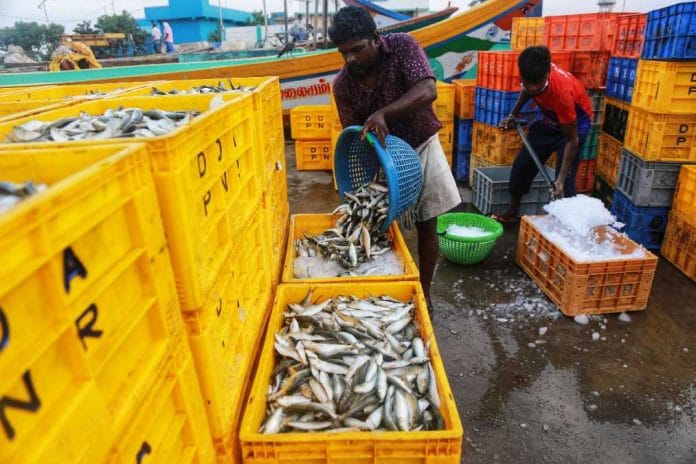New Delhi: India is witnessing a massive surge in Covid-19 cases with more than 2.76 lakh cases and over 7,700 deaths at last count.
For more than 10 weeks, ThePrint’s reporters and photojournalists have travelled across India to bring you the most accurate local news of how the coronavirus pandemic and lockdown have impacted the lives of millions of people.
This week, our journalists visited a fishing harbour and a car manufacturing unit in Tamil Nadu, and a cemetery and brick kilns in Telangana. They spoke to fisherfolk, contractual labourers, graveyard staff and local leaders to understand how they are dealing with the pandemic.
Also read: Mumbai Police’s Covid struggles, Chennai’s troubled vendors & how Telangana cops relying on AI
Fishing picks up in Chennai, Hyundai is cranking out cars
In Chennai, ThePrint’s Revathi Krishnan and Manisha Mondal met disaster management specialist Dr J. Radhakrishnan, who has been roped in as the special nodal officer for the Greater Chennai Corporation to streamline efforts against Covid-19. He was the district collector of Nagapattinam in 2004 when the tsunami hit and the health secretary during the 2015 Chennai floods. He was also put in charge when the Kumbakonam school fire broke out in 2004.
According to Radhakrishnan, disasters can’t be compared, and this pandemic is an unseen enemy. Read more here about the lessons he learnt and how he and his colleagues are working to contain the virus.
Chennai’s Kasimedu Fishing Harbour, one of the largest in Tamil Nadu, is now buzzing with activity. The period from April to June is a lean one for fisherfolk, as it is the breeding season, and fishing trawlers are banned from going out to sea. However, this year, the lockdown coincided with this period, leaving them with no income.
The ban period was thus cut short due to the lockdown and ended on 31 May. ThePrint found that even though the Kasimedu Fish Market is still shut, likely for another week, the fisheries department is leaving no stone unturned to ensure that once it opens, social distancing is maintained, from set timings to a cap on customers. The sector has faced a production loss of around 30,000 metric tonnes in the last two months. Read more here.
Over in Sriperumbudur, Chennai’s automotive corridor, India’s only Hyundai manufacturing unit produced 200 cars on the day it reopened from lockdown on 8 May, and has sold 12,583 units since then. Spokespersons from Hyundai told ThePrint that stringent Covid-safety norms were being followed there.
Bharati Desan and Ram Kumar, contractual labourers who work mainly in engine packaging, told ThePrint that while they were paid throughout the lockdown, Hyundai has now said it will only pay those workers who come to the factory. Read more here.
Also read: Chennai’s fishing industry is buzzing again as lockdown-hit lean season comes to an end
Brick kiln workers in Telangana want to return to Odisha
At a brick kiln near Kongara Kalan in the Rangareddy district, Neeran Jaal told ThePrint’s Aneesha Bedi and Suraj Singh Bisht that he has been trying to go back home to Odisha for weeks now, but neither is he getting paid nor has his “seth ji” (the owner of the kiln) arranged any transportation for him.
He added that the recent rains ruined the bricks that were ready, and he won’t be paid for them. Neither he, nor the other families from Odisha, who came here to work at the kilns have received the rations promised by the government, and Jaal vowed that once he finds a way to leave, he will never return to a place that treated him so shabbily.
It is a refrain ThePrint’s journalist heard at every kiln. Workers from Odisha form up to 90 per cent of the labour force at these kilns. According to many kiln owners, if the workers quit, it could really hurt the industry. They also insisted that they had done what they could for their labourers given that their own hands were tied due to lack of subsidies and materials coming in. Read more here.
In Hyderabad, ThePrint met the director of the Centre for Cellular and Molecular Biology, Rakesh Mishra, who explained that the institute’s new test could significantly increase India’s testing capacity. Acknowledging the concerns about India’s testing strategy, he said the new test, if all goes well, could increase daily capacity by up to 50,000 times.
Mishra also explained the central government’s efforts to develop a Covid-19 vaccine as well as an alternative to plasma therapy. He was also glad about one fallout of the pandemic, which is India realising the importance of investing in scientific research. Read more here.
About 16 km from Hyderabad, in Balapur, lies the Faqeer Mullah Kabristan. The graveyard covers an area of 50 acres, and 10 acres have now been reserved for those who died of coronavirus. The move came from AIMIM president and Hyderabad MP Asaduddin Owaisi, after he found that the staff at many burial grounds were refusing to bury Covid-19 patients because of the stigma.
Ahmed Saji, who supervises the graveyard, told ThePrint that while mostly Muslims were buried there, the section is open to victims of all faiths. Last Tuesday, the staff buried their youngest coronavirus victim, a three-month-old.
“Even we were really upset when we saw such a small body being buried and sadly not a single family member was around as the parents had been quarantined, and no other relatives wanted to come because there is a stigma attached to the disease,” said Habib Asif, who works at the cemetery. “Even the ambulance driver and staff were heartbroken. We read the namaz together, that’s the least we could do,” he added. Read more here.
Also read: This Hyderabad cemetery buries coronavirus victims no one else will






